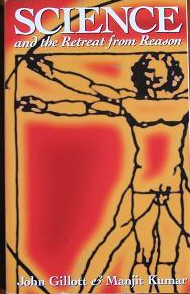John Gillott
LM network resources
|
John Gillott has a degree in applied mathematics. As of 2011 he is a Phd student at the ESRC Innogen Centre in the Faculty of Mathematics, Computing and Technology, Open University.[1] He formerly worked at the Genetic Interest Group (GIG) London, as a policy officer, and was also on the staff of the online clinical genetics resource Genepool along with Juliet Tizzard of Progress Educational Trust.[2] As a contributor to Living Marxism, (between 1992 and 2000, in which he sometimes used the 'Party name' John Gibson) Spiked (between 2001 and 2010 at least),[3] a speaker at Institute of Ideas events (for example on Wednesday 14 March 2007)[4] he is associated with the LM network.
Contents
The 'Patents on Life' Directive
In 1997 GIG became embroiled in controversy over the lobbying activities of Gillott's colleague, GIG's Director, for the EU Directive on the Legal Protection of Biotechnological Inventions (popularly known as 'Patents on Life'). What was controversial about Alistair Kent's lobbying for the Directive was that it was at total odds with GIG's declared policy of opposing attempts to patent genes (ibid.).
This policy departure is interesting when viewed in the context of the attitude of GIG's Policy Officer towards those that GIG should have been allied with in opposition to the Directive. 'The Directive has been vigorously opposed by environmental campaigners who say it is an aspect of the "race to commodify life" which amounts to "biopiracy"', Gillott wrote at the time in an article in LM magazine (formerly known as Living Marxism, and a monthly review of the Revolutionary Communist Party). Gillott dismissed such views as "rubbish peddled by the environmentalists" (ibid.).
Gillott was at the time LM's science editor. Since the demise of the magazine in 2000, he has been a regular contributor to the Spiked website edited by LM's ex-editor, Mick Hume. Both Gillott and his GIG colleague Alistair Kent have also spoken at events run by the Institute of Ideas, an organisation headed by LM's former co-publisher (ibid.).
Targeting Environmentalists

Environmentalists are consistently a key target in Gillott's writing. In 1999 Gillott appeared, like Juliet Tizzard, in the Channel Four TV series, Against Nature, directed by Martin Durkin. The series painted environmentalists as doom-mongering Nazi's responsible for the deprivation and death of millions in the Third World. In one of his Spiked-science articles from 2001, Gillott claims that the apparent scientific consensus on global warming is 'rigged through a media compliant to Environmentalists' extremism'[5]
Gillott's preoccupation with opposing and attacking the environmental movement is also a marked feature of a book he co-authored with Manjit Kumar, who was once a prominent member of the Revolutionary Communist Party. In Science and the Retreat from Reason (Monthly Review Press, 1997) - first published in Britain by Merlin Press (1995) - Gillott and Kumar argue that progress requires the unfettered growth of science. This it sees as threatened by the irrationality of the environmental movement.[6]
Despite being published by the Monthly Review Press, Gillott and Kumar's book attracted a review in their journal Monthly Review that contained some unusually scathing criticisms. In his review John Bellamy Foster argues that although the book advances a ' strong and in many ways brilliant defence of science and reason', in the end it 'turns, in my view, into the opposite.' The book, according to Bellamy Foster, takes on 'all the assumptions' of 'the current "brownlash" against environmentalism', ie the attempt to minimize the seriousness of environmental problems in order to fuel a backlash against environmentalism and 'green' policies.[7]
Bellamy Foster is also highly critical of the authors' thesis, advanced particularly in the book's penultimate chapter, that environmentalists are 'the main contemporary enemies of science and reason'. He also notes the authors' 'naive willingness to accept all technology without question' - something which 'is evident throughout Science and the Retreat from Reason.'[8]
The authors, he says, 'write as if the left is simply being irrational in being skeptical about the wisdom of obtaining "cheap electricity from atomic power" or the application of "genetic engineering" (p. 173) --as if these technologies did not raise quite horrific possibilities.' Gillott, by contrast, is no skeptic but a true believer, writing of 'an imperative to crack on with genetic engineering: it will help improve the human condition. Diseases will be cured, new drugs will be developed, and, in the distant future, we might want to make more fundamental changes to our genetic constitution.' [9]
Bellamy Foster continues, 'Not ones to stop half-way in their criticisms, Gillott and Kumar go on to contend that all of those who believe that there are ecological limits to economic growth (even ecological limits to capital accumulation) have succumbed to "a mass psychosis about limits in nature" (p. 166). Such views, we are told, are anti-science and anti-reason. Yet the fact remains that they are held by many, probably most, scientists, and hence cannot simply be presented--as Gillott and Kumar are wont to do--as attacks on science from without...'
Bellamy Foster continues, 'Ultimately, it is not just environmentalists who come under attack in Gillott and Kumar's book but all of those, among scientists and philosophers, who have raised questions about the role of science in contemporary society. Thus among those who are supposed to have retreated from science and reason we find, astonishingly, such names as Robert Oppenheimer (because of his quote from the Bhagavad Gita--"I am become death, the destroyer of worlds"--when viewing the first atomic blast), Bertrand Russell and Alfred North Whitehead (pp. 22, 113, 197).'[10]
Bellamy Foster concludes his review, 'It is difficult to understand, in fact, how a book that began with such a brilliant defense of science and reason, and indeed of realism, could lead in the end to such a state of unreason.'[11]
Publications
- Human Rights, Privacy and Medical Research; analysing UK policy on tissue and data, Genetic Interest Group, 2006 (available online as a pdf: http://www.gig.org.uk/docs/hrprivacypdf190506.pdf).
- 'Screening for disability: a eugenic pursuit?' J. Med. Ethics 2001, 27: 21-23.
- John Gillott Genetic engineering: a cautionary tale, LM 128 - March 2000, p. 18.
- Childhood testing for carrier status: the perspective of the Genetic Interest Group. In Clarke A (ed.) The Genetic Testing of Children, Bios Scientific Publishers 1998: 97-102.
- 'Confidentiality Guidelines' (with Jonathan Montgomery and Stewart Payne), (Genetic Interest Group 1998).
- 'Genetic Services in the United Kingdom' (with Sandy Raeburn and Alastair Kent), Eur. J. Hum. Genet. 1997; 5 (suppl. 2): 188-195.
- John Gillott and Manjit Kumar Science and the Retreat from Reason, London : Merlin Press, 1995. ISBN 0850364515 (hbk.) : 0850364337 (pbk.) & Monthly Review Press, 1997.
- John Gillott, 'Futures: New Food No Danger', Living Marxism, No. 96 - December/January 1996/7, p. 34.
- John Gillott, 'Futures: Carry on the car', Living Marxism, No. 94 - October 1996, p. 34.
- John Gillott, 'Futures: Who's afraid of nature's revenge?', Living Marxism, No. 90 - May 1996, p. 28.
- John Gillott, 'Futures: Chernobyl fall-out', Living Marxism, No. 89 - April, p. 34.
- John Gillott, 'Futures: Of oncomice and men', Living Marxism, No. 87 - February 1996, p. 34.
- John Gillott, 'Futures: The spectre of eugenics', Living Marxism, No. 86 - January 1996, p. 34.
- John Gillott and Nick Thwaites, 'Futures: Dump the Greenpeace platform', Living Marxism, No. 82 - September 1995, p. 34.
- John Gillot and Manjit Kumar, 'Futures: Science and the Bomb', Living Marxism, No. 81 - July/August 1995, p. 52.
- John Gillott and Dominic Wood, 'Futures: Who's afraid of global warming?', Living Marxism, No. 78 - April, p. 28.
- John Gillott, 'Futures: The dangers of 'sustainable development', Living Marxism, No. 76 - February, p. 34.
- John Gillott, 'Futures: Petrol pollution scam', Living Marxism, No. 74 - December 1994, p. 20.
- John Gillot, 'Futures: Of mice and men', Living Marxism, No. 73 - November, p. 34.
- John Gillott, 'Futures: A fear of science?', Living Marxism, No. 72 - October 1994, p. 34.
- John Gillott, 'Futures: Too many people?', Living Marxism, No. 71 - September 1994, p. 34.
- John Gillott and Manjit Kumar, 'Futures: Over the moon?', Living Marxism, No. 69 - July 1994, p. 22.
- John Gillott, 'Progress: Designer genes', Living Marxism, No. 66 - April, p. 32.
- John Gillott, 'No controls on infertility treatment', Living Marxism, No. 66 - April 1994, p. 24.
- John Gillott and Manjit Kumar, 'Progress: science fiction', Living Marxism, No. 65 - March 1994, p. 34.
- John Gillott, 'Progress: No man is a monkey', Living Marxism, No. 64 - February 1994, p. 16.
- John Gibson, 'Green patsies', Living Marxism, No. 63 - January 1994, p. 28.
- John Gibson, 'North Korea: nuclear Gooks?', Living Marxism, No. 63 - January 1994, p. 24.
- John Gibson, 'Environmental imperialism', Living Marxism, No. 62 - December 1993, p. 34.
- John Gibson, 'Lots of pain, but no gain', Living Marxism, No. 61 - November 1993, p. 24-7.
- John Gibson, 'The real dangers of Jurassic Park', Living Marxism, No. 60 - October 1993, p. 24.
- John Gibson, 'The Burt scandal', Living Marxism, No. 50 - December 1992, p. 34.
- John Gibson and Manjit Singh, 'The scapegoating of science', Living Marxism, No. 48 - October 1992, p. 35.
- John Gibson and Manjit Singh, God and the Big Bang, Living Marxism, No. 44 - June 1992, p. 34.
Affiliations
References
- ↑ John Gillott, accessed 11 March 2011
- ↑ GM Watch 'John Gillott', Accessed 1st August 2007.
- ↑ Spiked Articles by John Gillott, accessed 11 March 2011
- ↑ Institute of Ideas Health forum, accessed 11 March 2011
- ↑ Spiked Online 'Global Warming - where's the consensus?', Accessed 1st August 2007.
- ↑ John Gillott and Manjit Kumar Science and the Retreat from Reason, London : Merlin Press, 1995.
- ↑ Science in a Skeptical Age by John Bellamy Foster, Review of, John Gillot and Manjit Kumar, Science and the Retreat from Reason (Monthly Review Press, 1997), 288 pp., $18. Monthly Review, Accessed 1st August 2007.
- ↑ Science in a Skeptical Age by John Bellamy Foster, Review of, John Gillot and Manjit Kumar, Science and the Retreat from Reason (Monthly Review Press, 1997), 288 pp., $18. Monthly Review, Accessed 1st August 2007.
- ↑ 'Progress: Designer Genes', Living Marxism Issue 66, April 1994.
- ↑ Science in a Skeptical Age by John Bellamy Foster, Review of, John Gillot and Manjit Kumar, Science and the Retreat from Reason (Monthly Review Press, 1997), 288 pp., $18. Monthly Review, Accessed 1st August 2007.
- ↑ Science in a Skeptical Age by John Bellamy Foster, Review of, John Gillot and Manjit Kumar, Science and the Retreat from Reason (Monthly Review Press, 1997), 288 pp., $18. Monthly Review, Accessed 1st August 2007.

